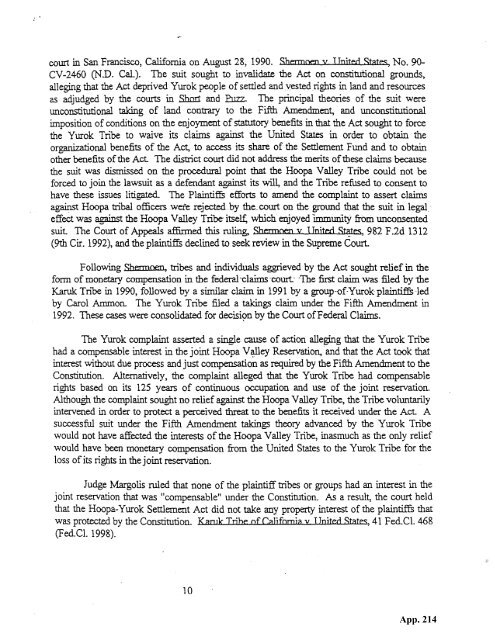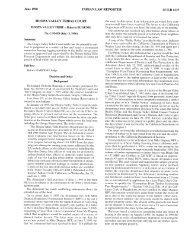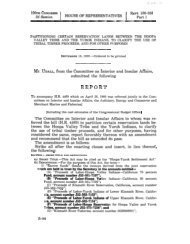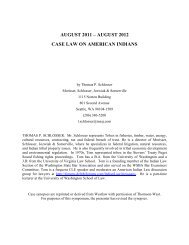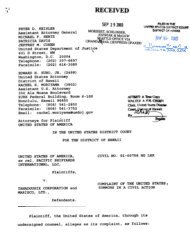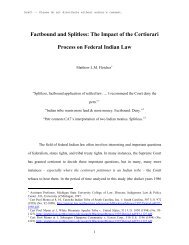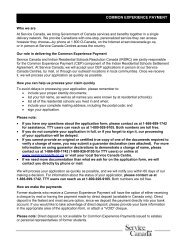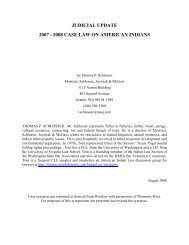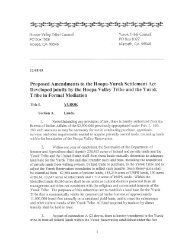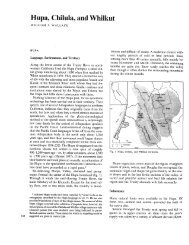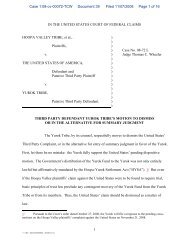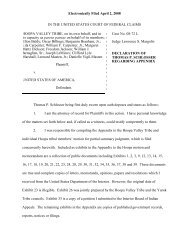Hoopa appendix supporting summary judgment - Schlosser Law Files
Hoopa appendix supporting summary judgment - Schlosser Law Files
Hoopa appendix supporting summary judgment - Schlosser Law Files
Create successful ePaper yourself
Turn your PDF publications into a flip-book with our unique Google optimized e-Paper software.
court in San Francisco, California on August 28, 1990. Shermc~env Tliiitecl StRtec, No. 90-<br />
CV-2460 (N.D. CaL). The suit sought to invalidate the Act on constitutional grounds,<br />
alleging that the Act deprived Yurok people of settled and.vested rights in land and resources<br />
as adjudged by the courts in Short and Th~zz. The principal theories of the suit were<br />
unconstitutional taking of land contrary to the Fi~ Amendment, and unconstitutional<br />
imposition ofconditions on the enjoyment ofstatutory benefits in that the Act sought to force<br />
the Yurok Tribe to waive its claims ~ainst the United States in order to obtain the<br />
organizational benefits of the Act, to access its share of the Settlement Fund and to obtain<br />
other benefits ofthe Act The district court did not address the merits ofthese claims because<br />
the suit was dismissed on the procedural point that the <strong>Hoopa</strong> Valley Tribe could not be<br />
forced to join the lawsuit as a defendant against its will, and the Tribe refused to consent to<br />
have these issues litigated. The Plaintiffs efforts to amend the complaint to assert claims<br />
against <strong>Hoopa</strong> tribal officers wefe rejected by the~courton the ground that the suit in legal<br />
effect was a~incthe <strong>Hoopa</strong> Valley Tribe itself~which enjoyed immunity from unconisented<br />
suit The Court of Appeals affirmed this ruling, Sh~rmo~nv 1 Inited Statec~982 F.2d 1312<br />
(9th Cir. 1992), and the plaintiffs declined to seek review in the Supreme Court..<br />
Following Shermnen, tribes and individuals aggrieved by the Act sought relief in the<br />
form of monetaiy compensation in the federalclaims courL The first claim was filed bythe<br />
Karuk Tribe in 1990, followed by a similar claim in 1991 by a group-of-Yurok plaintiffs-led<br />
by Carol Ammon.. The Yurok Tribe filed a takings claim under the Fifth Amendment in<br />
1992. These cases were consolidated for decision by the Court ofFederal Claims.<br />
The Yurok complaint asserted a single cause of action alleging that the Yurok Tribe<br />
had a compensable interest in the joint <strong>Hoopa</strong> Valley Reservation, and that the Act took that<br />
interest without due process andjust compensation as required by the Fifth Amendment to the<br />
Constitution. Alternatively, the complaint alleged that the Yurok Tribe had compensable<br />
rights based on its 125 years of continuous occupation and use of the joint reservation.<br />
Although the complaint sought no relief against the <strong>Hoopa</strong> Valley Tribe, the Tribe voluntarily<br />
intervened in. order to protect a perceived threat to the benefits it received under the Act A<br />
successful suit under the Fifth Amendment takings theory advanced by the Yurok Tribe<br />
would not have affected the interests of the <strong>Hoopa</strong> Valley Tribe, inasmuch as the only relief<br />
would have been monetary compensation from the United States to the Yurok Tribe for the<br />
loss ofits rights in the joint reservation.<br />
Judge Margolis ruled that none of the plaintiff tribes or groups had an interest in the<br />
joint reservation that was “compensable” under the Constitution. As a result, the court held<br />
that the <strong>Hoopa</strong>-Yurok Settlement Act did not take any property interest of the plaintif~that<br />
was protected by the Constitution. K~nikTribe of CR1iforni~v Tlniteii St~t~c, 41 Fed.Cl. 468<br />
(Fed.C1. 1998).<br />
10


